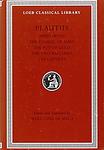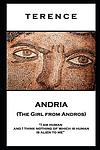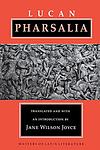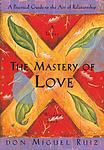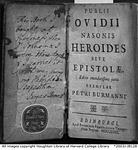The Greatest Latin, Roman "Ancient Literature" Books of All Time
Click to learn how this list is calculated.
This list represents a comprehensive and trusted collection of the greatest books. Developed through a specialized algorithm, it brings together 305 'best of' book lists to form a definitive guide to the world's most acclaimed books. For those interested in how these books are chosen, additional details can be found on the rankings page.
Genres
Ancient Literature refers to the body of written works produced during the earliest periods of human history, typically up until the fall of the Roman Empire in the 5th century AD. This category encompasses a diverse array of texts, including religious scriptures, epic poetry, philosophical treatises, historical accounts, and dramatic plays, originating from various civilizations such as the Sumerians, Egyptians, Greeks, Romans, Chinese, and Indians, among others. Notable works within this genre include the "Epic of Gilgamesh," Homer's "Iliad" and "Odyssey," the plays of Sophocles and Euripides, the philosophical writings of Plato and Aristotle, the "Mahabharata" and "Ramayana" from India, and the foundational texts of Confucianism and Taoism in China. Ancient literature provides invaluable insights into the thoughts, beliefs, and cultural practices of early societies, and continues to influence modern storytelling, philosophy, and ethics.
Countries
Date Range
Reading Statistics
Click the button below to see how many of these books you've read!
Download
If you're interested in downloading this list as a CSV file for use in a spreadsheet application, you can easily do so by clicking the button below. Please note that to ensure a manageable file size and faster download, the CSV will include details for only the first 500 books.
Download-
1. The Aeneid by Virgil
This epic poem tells the story of Aeneas, a Trojan who travels to Italy, where he becomes the ancestor of the Romans. It includes a series of prophecies about Rome's future and the deeds of heroic individuals, and is divided into two sections, the first illustrating the hero's journey and the second detailing the wars and battles that ensue as Aeneas attempts to establish a new home in Italy. The narrative is deeply imbued with themes of duty, fate, and divine intervention.
The 75th Greatest Book of All Time -
2. Metamorphoses by Ovid
"Metamorphoses" is a classical epic poem that narrates the history of the world from its creation to the deification of Julius Caesar within a loose mythico-historical framework. The narrative is filled with stories of transformation, focusing on myths and legends of the Greek and Roman world. The tales, which include the stories of Daedalus and Icarus, King Midas, and Pyramus and Thisbe, among others, are all linked by the common theme of transformation, often as a punishment or reward from the gods.
The 331st Greatest Book of All Time -
3. De Rerum Natura by Lucretius
"De Rerum Natura" is a long didactic poem written in the first century BC, which explores Epicurean philosophy and the nature of the universe. The text delves into topics such as the nature of the gods, the atomic structure of the universe, human sensation and thought, and the fear of death. The author argues that understanding the physical world can free humans from superstition and fear, leading to peace of mind and true happiness.
The 493rd Greatest Book of All Time -
4. The Golden Ass (Metamorphoses): Or Metamorphoses by Apuleius
This classic novel follows the protagonist, a young man who is transformed into a donkey after meddling with magic he doesn't understand. His journey takes him through a series of adventures, where he encounters a variety of characters from different walks of life and gets into all sorts of trouble. Through his experiences, he gains a deeper understanding of the human condition and the world around him. The narrative also includes several mythological tales and allegories, including the famous story of Cupid and Psyche. Eventually, the protagonist regains his human form through divine intervention, having learned valuable lessons about life, love, and humanity.
The 636th Greatest Book of All Time -
5. The Odes by Horace
"The Odes" is a collection of lyric poems by an ancient Roman poet. The poems cover a wide range of themes, including love, friendship, wine, nature, morality, and the human condition. The author's style is noted for its elegance, wit, and mastery of meter. The poems also reflect the social and political context of Rome during the author's lifetime, providing insight into the culture and values of the period.
The 1063rd Greatest Book of All Time -
6. Letters from a Stoic by Seneca
"Letters from a Stoic" is a collection of moral epistles written by a renowned Stoic philosopher. The letters provide practical guidance on everything from dealing with adversity and the pursuit of wisdom to the folly of consumerism and the nature of friendship. The author's stoic philosophy encourages peace of mind through understanding and accepting the natural order of the universe, and his letters offer timeless wisdom and insights that are still relevant today.
The 1710th Greatest Book of All Time -
7. Titi Livi Ab urbe condita libri by Livy
This historical work offers a comprehensive narrative of the history of Rome, from its mythical origins to the reign of the Roman Emperor Augustus. The author chronicles the major political, military, and social events of the Roman Republic, including the founding of the city, the establishment of the Republic, the Punic Wars, and the rise of Julius Caesar. The book is a significant source of information about the early history of Rome and is often considered one of the most important works of Roman history.
The 2409th Greatest Book of All Time -
8. Poetry by Quintus Lutatius Catulus
This book is a collection of ancient Roman poetry by a renowned statesman and poet. The poems reflect the author's experiences, thoughts, and feelings about life, love, politics, and society during the Roman Republic era. The author's eloquent and vivid writing style, combined with his astute observations and insights, make this book a valuable resource for understanding Roman culture and history.
The 2846th Greatest Book of All Time -
9. Attis And Other Poems by Catullus
"Attis and Other Poems" is a collection of lyrical works that delve into themes of love, desire, and personal anguish. The poems are characterized by their emotional intensity and vivid imagery, often reflecting the poet's own tumultuous love affairs and inner turmoil. The titular poem, "Attis," stands out with its mythological narrative and exploration of themes such as identity and transformation. Throughout the collection, the poet's mastery of language and form is evident, as he skillfully weaves together personal experiences with broader reflections on human nature and the complexities of the human heart.
The 2900th Greatest Book of All Time -
10. Natural History by Pliny (the Elder)
"Natural History" is an extensive work of literature that provides a comprehensive look at the knowledge of the natural world during the Roman era. The book is divided into 37 volumes, each focusing on different aspects such as geography, anthropology, zoology, botany, and mineralogy. The author's curiosity and fascination with the world are evident in his detailed observations and descriptions. The book also includes discussions on art, sculpture, and various other topics, providing a rich and detailed snapshot of the Roman understanding of the world.
The 3204th Greatest Book of All Time -
11. On Obligations by Marcus Tullius Cicero
"On Obligations" is a philosophical treatise that explores the ethical and moral duties of individuals in society. Written in the form of a dialogue, the text delves into the nature of justice, the importance of the common good, and the role of virtue in personal and public life. The author articulates a framework for understanding and fulfilling one's obligations, which he argues are derived from both natural law and human reason. Through a detailed examination of various ethical dilemmas and practical situations, the work provides insights into how individuals should act with integrity and wisdom to uphold both legal and moral responsibilities.
The 3796th Greatest Book of All Time -
12. Treatises On Friendship And Old Age by Marcus Tullius Cicero
The book comprises two philosophical essays that delve into the nature and significance of friendship and the challenges and wisdom of old age. The first essay explores the meaning of true friendship, its role in society, and its importance as a foundation for moral and happy life, emphasizing mutual respect, virtue, and genuine affection. The second essay addresses the concerns of aging, arguing against the common perceptions of old age as a miserable phase. Instead, it presents old age as a period capable of great mental and intellectual activity and satisfaction, provided one has lived a life based on virtue and fulfillment. Through these essays, the text provides timeless insights into handling some of life's most profound transitions with grace and wisdom.
The 3796th Greatest Book of All Time -
13. Eclogues by Virgil
The book in question is a collection of ten pastoral poems that delve into the idealized lives of shepherds in classical antiquity, set against the backdrop of a changing rural landscape. Through dialogues and monologues, the poems explore themes of love, the bucolic lifestyle, and the political turmoil of the time. The work reflects on the tensions between the simplicity of rural life and the encroaching influence of external forces, often drawing on mythological and allegorical elements to convey its messages. The pastoral mode serves as a platform for the poet to address broader social and political issues, while also celebrating the beauty and tranquility of nature.
The 4157th Greatest Book of All Time -
14. Epistles by Horace
"Epistles" is a collection of poetic letters offering insights into the human condition, moral philosophy, and the art of living well. Written in the first century BCE, the work reflects the author's mature thoughts on various subjects, ranging from personal ethics to literary criticism. Through these letters, the poet shares his wisdom with friends and notable contemporaries, employing a conversational tone that blends humor, irony, and sincerity. The epistles serve as a guide to practical wisdom, emphasizing moderation, self-awareness, and the importance of living in harmony with nature and society.
The 4157th Greatest Book of All Time -
15. Satires by Horace
"Satires" is a collection of poetic essays that delve into the follies and vices of Roman society during the first century BCE. Through a series of witty, critical, and often self-deprecating poems, the author explores themes such as greed, corruption, and social ambition, while advocating for a life of moderation and philosophical contentment. Employing a conversational tone and a keen eye for the absurd, the work satirizes the behaviors of both the elite and the common people, offering a timeless reflection on human nature and the pursuit of happiness.
The 4157th Greatest Book of All Time -
16. Georgics by Virgil
The work in question is a didactic poem divided into four books, which collectively offer a rich and detailed guide to various aspects of agricultural life and practices in the ancient world. It covers topics such as the cultivation of crops, the care of trees and vines, the husbandry of livestock, and the management of bees, all interwoven with philosophical reflections on humanity's relationship with nature and the gods. The poem also explores the hardships and rewards of rural life, emphasizing the importance of hard work, experience, and understanding the rhythms and moods of the natural world. Throughout, the text is imbued with a deep appreciation for the land and serves as both a practical manual and a meditation on the art of living in harmony with the environment.
The 4157th Greatest Book of All Time -
17. On The Ends Of Good And Evil by Marcus Tullius Cicero
"On the Ends of Good and Evil" is a philosophical work that explores the ethical theories of Hellenistic schools, including Stoicism, Epicureanism, and the Peripatetic tradition. Through a series of dialogues, the text delves into the nature of happiness and the ultimate end of human action, examining what constitutes the highest good. The author critiques and compares the doctrines of these schools, ultimately defending the Stoic view that virtue is the sole basis of happiness and the ultimate goal in life, while also acknowledging valuable insights from other philosophical traditions.
The 4695th Greatest Book of All Time -
18. Thyestes by Seneca
"Thyestes" is a classic tragedy that centers around the mythological figures of the House of Atreus. The story unfolds as Atreus, the King of Mycenae, seeks revenge on his brother Thyestes for committing adultery with his wife. In a gruesome act of vengeance, Atreus kills Thyestes' sons and serves them to him at a feast. The narrative explores themes of power, betrayal, revenge, and the horrific consequences of unchecked ambition.
The 5751st Greatest Book of All Time -
19. Amphitryon by Plautus
The play is a comedic tale set in ancient Greece, where the god Jupiter, enamored with Alcmena, the wife of the general Amphitryon, takes on her husband's form to seduce her while Amphitryon is away at war. Meanwhile, Mercury, the messenger god, assists Jupiter by disguising himself as Amphitryon's slave, Sosia. The resulting confusion and mistaken identities lead to a series of humorous situations, as the real Amphitryon returns home to find his place usurped by the god. The play explores themes of deception, infidelity, and the interplay between gods and mortals, all wrapped up in a farcical package that entertains while it provokes thought about the nature of identity and trust.
The 5910th Greatest Book of All Time -
20. The Girl From Andros by Terence
"The Girl From Andros" is a classic Roman comedy that revolves around the complexities of love and mistaken identity. The plot centers on a young Athenian man who falls in love with a girl believed to be a courtesan from the island of Andros, but who is, in fact, a freeborn woman. As he seeks to marry her, he must navigate the social expectations of his status, the interference of his slave who tries to help him with a cunning plan, and the revelation of the girl's true identity. The play humorously explores themes of class, romance, and the roles of women in ancient society, all while employing the typical misunderstandings and deceptions of comedic storytelling.
The 7180th Greatest Book of All Time -
21. Satires by Persius
The book is a collection of six satirical poems written in Latin, which delve into the moral and philosophical concerns of the author's time. Through sharp wit and a penetrating critique of contemporary Roman society, the author exposes the vices and follies of his peers, particularly targeting the corruption, greed, and hypocrisy that he perceives. The work reflects Stoic philosophical ideals and emphasizes the importance of virtue, self-awareness, and the pursuit of wisdom over material wealth and superficial success. Despite its serious themes, the book is known for its poetic artistry and the clever use of language to convey its biting commentary on the moral decay of society.
The 7180th Greatest Book of All Time -
22. Pharsalia by Lucan
"Pharsalia," also known as "The Civil War," is an epic poem that delves into the intense and tumultuous period of the Roman Republic's downfall, focusing on the conflict between Julius Caesar and Pompey the Great. The narrative, rich in rhetorical and dramatic elements, presents a grim and philosophical reflection on the nature of power, the moral decay of Rome, and the catastrophic consequences of civil strife. Through its vivid and often gruesome depictions of battles, political intrigue, and the personal ambitions that drive men to treachery and violence, the poem serves as a cautionary tale about the fragility of political systems and the human cost of war.
The 7180th Greatest Book of All Time -
23. The Art Of Love by Ovid
The book in question is a didactic poem that explores the intricacies of love and seduction from the perspective of ancient Roman society. It offers a series of instructions and advice on how to attract and retain lovers, presented in a playful and often ironic tone. The work is divided into three books, with the first two primarily addressing men and teaching them how to find, win, and keep a woman's love, while the third book is directed at women, advising them on how to secure and captivate a man's affection. Throughout the text, the author interweaves mythological references and personal anecdotes, creating a rich tapestry of amorous strategies that reflect the social and moral attitudes towards love and relationships of his time.
The 7180th Greatest Book of All Time -
24. Heroides by Ovid
The book is a collection of fifteen epistolary poems presented as though written by various mythological heroines of Greek and Roman lore to their absent lovers. These letters express the women's emotions as they lament their separation, recount their memories, and plead for their lovers' return. The work explores themes of love, betrayal, and the female perspective within the context of classical myths, offering a unique insight into the emotional lives of characters such as Penelope, Dido, and Medea, who are traditionally depicted through the eyes of male heroes and writers.
The 7180th Greatest Book of All Time -
25. Satires by Juvenal
"Satires" is a collection of poetic essays from ancient Rome that offer a scathing critique of the social and political landscape of the time. The work delves into the corruption, decadence, and moral decay of Roman society, using biting wit and a satirical tone to expose the vices and follies of its citizens and leaders. The author employs a range of literary devices, from irony to hyperbole, to lambast the greed, hypocrisy, and depravity he perceives, while also reflecting on human nature and the challenges of living a virtuous life amidst widespread societal failings. The text is not only a commentary on the specific historical context but has also been interpreted as a timeless exploration of the human condition.
The 7180th Greatest Book of All Time
Reading Statistics
Click the button below to see how many of these books you've read!
Download
If you're interested in downloading this list as a CSV file for use in a spreadsheet application, you can easily do so by clicking the button below. Please note that to ensure a manageable file size and faster download, the CSV will include details for only the first 500 books.
Download















